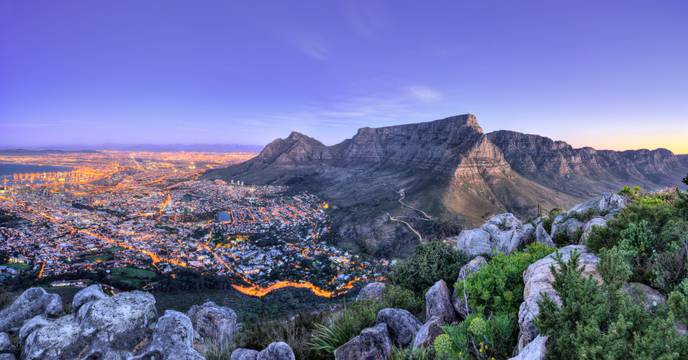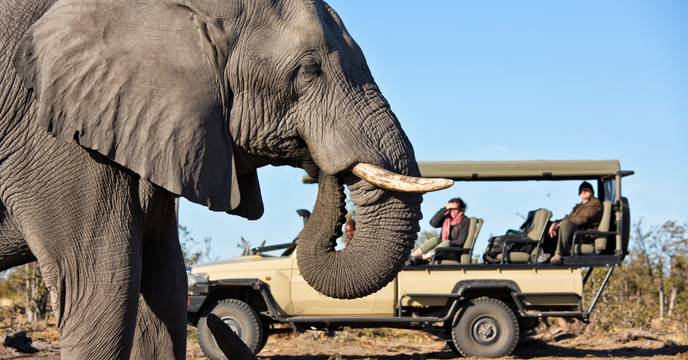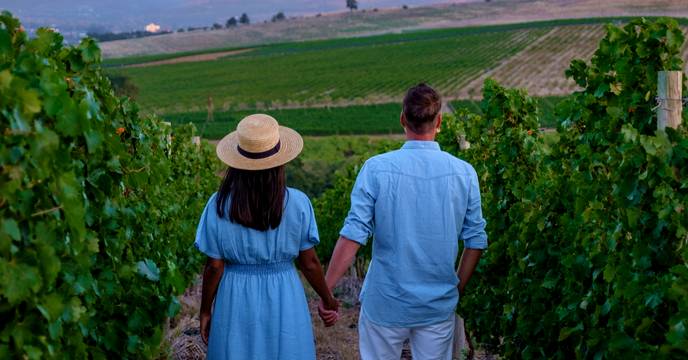
Best Time to Visit South Africa
Table of contents
Spring/Fall in South Africa
Summer in South Africa
Monthly activities and tourists
Seasonal guide to prices
Travel companies in South Africa
FAQ
Whether you're seeking the cool bliss of Cape Town's winter or the wild bloom of Johannesburg's spring, every season offers a unique spectacle in South Africa. The best time to visit South Africa is during its shoulder seasons – March to May and September to November. During these months, you’ll get the chance to explore the most visited cities like Cape Town, Durban, and Johannesburg at their peak, as well as experiencing the very best of South African nature – all alongside a warm welcome.
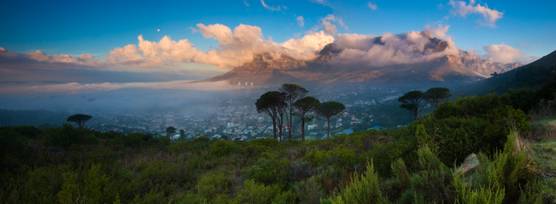
Best time to visit South Africa: Spring & Fall
Why visit during these months:
Wildlife wonders: Both seasons are prime for wildlife viewing, with lower rainfall and minimal foliage providing optimal conditions for spotting the Big Five in Kruger National Park.
Beach bliss: Experience beach days with perfect temperatures and surf the waves in Durban or relax on the sun-kissed shores. Whale watching is also a highlight in the fall, with migrations visible along the south coast.
Cultural festivals: Immerse yourself in vibrant events celebrating the rich diversity of South African heritage.
Floral and Green Spectacles: In spring, witness the Western Cape’s wildflowers bloom into a vibrant tapestry. Meanwhile, fall’s cooler temperatures and winter rainfall transform arid regions into lush, green landscapes.
Off-peak perks: Enjoy popular attractions without the crowds.
Adventure awaits: These months offer ideal weather conditions for epic outdoor activities like hiking in the Drakensberg or diving with sharks in Gansbaai.
Top things to do and see in South Africa during Spring & Fall
Three essentials to pack for your South Africa trip during Spring & Fall
Safari gear
Wear earth-toned clothing for game drives, and make sure you bring a reliable pair of binoculars to spot distant wildlife.
Coastal kit
Swimsuits and sun protection are must-haves for the sun-drenched beaches and vibrant coastal scenes.
Cultural respect
Modest attire for visiting local communities and historical sites, reflecting a sensitivity to South Africa’s diverse cultures.
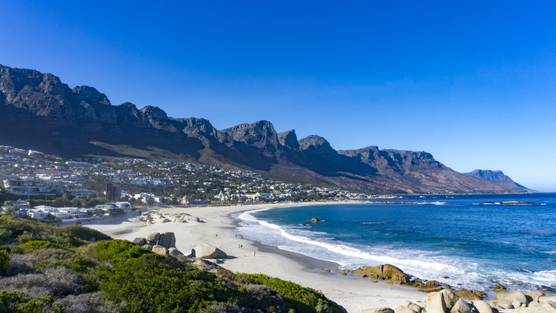
Best time to visit South Africa: Summer
Why visit in summer:
Winter Escape: Swap snow for sun and enjoy warm, beach-perfect days along South Africa’s stunning coastline.
Prime Wildlife Viewing: Waterholes attract animals, making for thrilling safari moments, even during the warmer months.
Festivals and Culture: Summer is festival season, with events like the Cape Town Carnival and New Year celebrations showcasing local culture.
Floral and Scenic Routes: The Garden Route is lush and colorful, perfect for road trips and hikes.
Outdoor Fun: Long, sunny days are ideal for surfing, vineyard tours, hot air ballooning, and snorkeling.
Clear Night Skies: Warm, cloudless nights provide perfect stargazing opportunities.
Top things to do and see in South Africa in summer
Three essentials to pack for your South Africa tour in fall
Light clothing
Breathable fabrics and swimwear for hot days.
Sun Protection
Sunscreen, sunglasses, and hats are a must.
Evening Layers
Light jackets for cooler evenings.
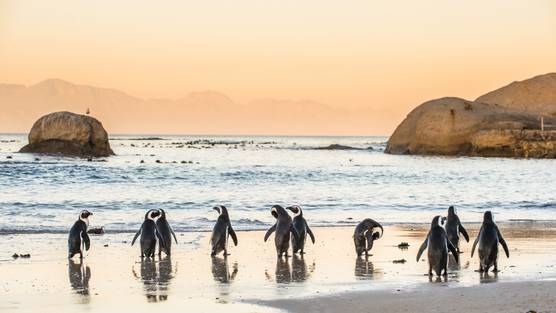
South Africa outside the peak times
Enjoy cozy safaris, thrilling whale watching along the coast, and snow-capped mountain adventures in the Drakensberg. Whenever you visit South Africa, you’ll find wonders to enjoy every day of the year.
Overview of activities and tourists in South Africa per month
South Africa offers a diverse calendar of activities and events throughout the year. January's Cape Town Minstrel Carnival bursts with color and music, while July’s Knysna Oyster Festival offers culinary delights. Spring (September to November) welcomes eco-travelers looking to experience the floral spectacle of the Namaqualand. The allure of summer (December to February) lies in golden beaches and adventure sports, while fall (March to May) is perfect for wine tours during the vineyard harvest. During winter (June to August), safaris and stargazing reign supreme. So, no matter when you choose to visit, you’ll soon realize that each season holds its own charm and array of experiences.
| Month | Popular Activities | Tourist Volume | Season |
|---|---|---|---|
| January | Beach holidays (Cape Town, Garden Route), safaris (Eastern Cape) |
High
| High season |
| February | Beach holidays, safaris, wine tours in the Winelands, luxury train journeys |
High
| High season |
| March | Coastal exploration, safaris (Tswalu Kalahari Reserve), wine tours |
Moderate
| High season |
| April | Easter celebrations, wine tours, wildlife safaris, hiking (Drakensberg Mountains) |
Moderate
| Shoulder season |
| May | Autumn activities (Cape region), whale watching preparation, wildlife safaris | Low/Moderate | Shoulder season |
| June | Winter safaris (Kruger, Eastern Cape), wildlife viewing |
Low
| Low season |
| July | Whale watching (Western Cape), safaris, Namaqualand flower tours |
Low
| Low season |
| August | Whale watching, safaris, blooming gardens (West Coast) |
Low
| Low season |
| September | Wildflower season (West Coast), safaris, whale watching |
Moderate
| Shoulder season |
| October | Beach holidays, Garden Route exploration, whale watching |
Moderate
| Shoulder season |
| November | Early summer beach holidays, wine tours, safaris (northern regions may start rainy season) | Moderate/High | Shoulder season |
| December | Beach holidays, festive events (Cape Town), safari experiences |
High
| High season |
South Africa adventures
By experience
The best time to visit South Africa: A seasonal guide to prices
Plan your adventure budget according to the time of year. The high season – spanning the summer months and festive December – sees peak prices. The low season offers better rates and quieter reserves, while the shoulder seasons balance cost and crowds. You’ll pay more moderate prices while experiencing the very best of the country’s natural beauty – without the high-season hustle. Each season in South Africa has its unique allure, as diverse and inviting as the land itself.
High Season Overview
- Premium pricing: Expect higher accommodation and tour rates during summer and festive periods.
- Perfect weather: Sun worshippers cherish the hot, dry climate for beach and outdoor activities.
- Festive buzz: The peak season is ideal for those who love the electrifying atmosphere of a country in celebration.
Low Season Overview
- Reduced rates: Get more bang from your buck with lower prices as tourist volumes dip.
- Tranquil travels: Enjoy a more intimate travel experience with quieter parks and attractions.
- Cool and quiet: A paradise for those seeking solitude or interested in southern whale migrations.
Shoulder Season Overview (March to May and September to November):
- Average prices: Experience the best of both worlds – a balance between affordability and available activities.
- Mild climate: Enjoy comfortable weather for wildlife adventures and scenic outings.
- Lower crowds: Suited for travelers seeking a harmonious trip that combines value with authenticity.
Top-rated operators for South Africa tours
What people ask about South Africa
When is the peak tourist season in South Africa?
The peak tourist season in South Africa coincides with the summer months—primarily December to February—when beaches and attractions are in full flourish.
Can I go on safari outside the traditional best times to visit?
Absolutely, winter months offer excellent safari opportunities. There is less foliage and great wildlife viewing, making June to August a smart choice.
Are prices for tours significantly higher during the high season?
Yes, during high season, particularly around holidays, you'll find that tour and accommodation prices can be higher due to increased demand.
What's special about visiting South Africa in shoulder seasons?
The shoulder seasons (from March to May and September to November) offer mild weather and lower rates. There are also typically fewer tourists – plus, you’ll have a better chance of spotting transitioning wildlife.
Will I be able to see the famous wildflower blooms at any time?
The wildflower blooms are a spectacle best seen from late August to September, notably in the Northern Cape region during the beginning of spring.
Is whale watching available all year round in South Africa?
Whale watching is seasonal. The prime time is from June to November, when you can witness the migration along the Southern Cape coast.
24/7 Customer Support
Our team of experienced tour specialists have traveled to hundreds of countries around the globe and have decades of first-hand travel experience to share. Contact us now to have all of your tour-related questions answered!
More about South Africa
- Fully Guided (372)
- December 2025 (366)
- Family (345)
- Wildlife (341)
- Christmas & New Year (285)
- January 2026 (277)
- February 2026 (241)
- Cape Town (206)
- Johannesburg (205)
- Safari (146)
- 7 Day (145)
- Garden Route (141)
- Private (129)
- Kruger National Park (124)
- South Africa, Zimbabwe and Botswana (122)
- 2 Week (112)
- Botswana and South Africa (98)
- 10 Day (91)
- 3 Week (78)
- Namibia and South Africa (65)
- Active (63)
- Limpopo (54)
- 3 Day (46)
- Wine tasting (35)
- Desert (25)
- Overland Truck (25)
- Table Mountain (17)
- Beach (16)
- Coach / Bus (14)
- Hiking & Trekking (11)
- Walking Adventure (10)
- Durban (10)
- Kenya and South Africa (9)


